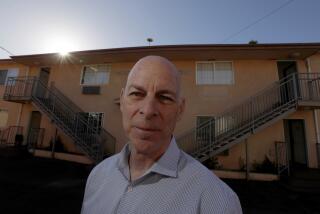What price hope?
- Share via
Does Los Angeles have a conscience?
Does it have a heart?
If the answer to either one of those questions is yes, then we ought to share a common anguish over the crisis that threatens to cripple Homeboy Industries, the phenomenally successful gang intervention program founded 18 years ago by Father Gregory Boyle at East L.A.’s Dolores Mission. More than simply wringing hands, this county’s wealthiest men and women need to step up and help put this invaluable program back on its feet.
Homeboy, which occupies a strikingly vibrant headquarters near Union Station, operates successful cafe, bakery and silk-screening businesses. It also provides job training, work, counseling, educational programs, legal assistance and tattoo removal to 12,000 young men and women formerly involved in gangs from all over Los Angeles County. It is what every social service organization purports, or aspires, to be: an effective program with a soul.
However, as the demands for its services have risen, Homeboy has been pinched by the general drop in charitable contributions that have followed from the grim economy. Since last fall, when the organization’s problems surfaced, Boyle and his staff have been relying on a stream of small donations to cobble together their payroll. On Thursday, they had to lay off 330 of the 427 people they employed. Boyle and his staff will continue to work without pay, and the profitable cafe, bakery and silk-screen businesses will go on as usual.
Essentially, Homeboy needs $5 million in what amounts to bridge funding to carry it through until, as planned, the growing revenues from those successful businesses can support the rest of the program. This is an organization that has saved thousands of lives and demonstrably contributed not only to the lives of the young people it serves but also to our collective public safety. That’s why Boyle and his work are supported strongly by both Police Chief Charlie Beck and Sheriff Lee Baca. What, moreover, is $5 million in a city that spends $25 million annually on gang intervention programs of dubious efficacy? What is it in a city with eight billionaires and millionaires by the thousands?
Boyle and I have been friends for more than 20 years, and though he doesn’t do bitter, he does do bemused. That was his mood Thursday, when he wondered how a city and county that “wouldn’t close an animal shelter ever,” that has rallied to save its Museum of Contemporary Art and the Hollywood sign, could stand by and let Homeboy nearly go under. “A Warhol, a sign on a hillside, any puppy are more valuable to the city and county of Los Angeles than all the 12,000 gang members who come through our door every year,” he said. “Part of my sadness is that the poor get this place, but the rich just don’t. Too many of them believe that there are some lives that matter more than others, and our kids matter least of all.”
Boyle pointed out that Homeboy’s core businesses never have been more successful. “Ralphs is now taking our Homegirl salsas for all its stores. We’ve got a shot at opening another cafe in the renovated LAX, and even Patina now is a client of our bakery. We’re the opposite of a sinking ship.”
For the sake of its soul, this city and county need to show the young people who have found hope at Homeboy that we don’t believe that they’re dispensable, that their lives matter less than others. That’s why I called former Mayor Richard Riordan, whose experience as a successful venture capitalist has made him a particularly effective and hardheaded philanthropist, and asked him whether he was willing to step in and help out Boyle and his staff.
He agreed without hesitation, reminding me that a few years ago, he personally contributed $50,000 to Homeboy, a sum he helped persuade billionaires like Cheryl Saban and Stewart and Lynda Resnick to match. “There’s no question Greg Boyle is a saint,” Riordan said, “but even saints need good businessmen who can recruit other wealthy businessmen to keep them going.... I can help with that. Give them my home phone number.”
And so I have. Once Boyle and Riordan have their mutual efforts on behalf of these young people underway, you can look to this column to see who has responded and what more needs to be done.
Friday morning, Boyle reminded that “ Martin Luther King said once, ‘I have felt the power of God transform the fatigue of despair into the buoyancy of hope.’ That’s what every homie, and anyone else who visits, experiences in our place.”
What price can Los Angeles put on hope?
More to Read
Sign up for Essential California
The most important California stories and recommendations in your inbox every morning.
You may occasionally receive promotional content from the Los Angeles Times.













